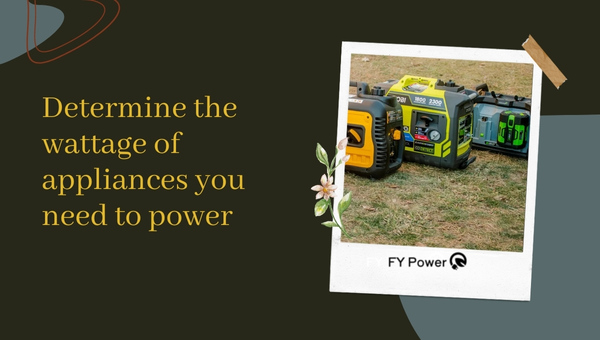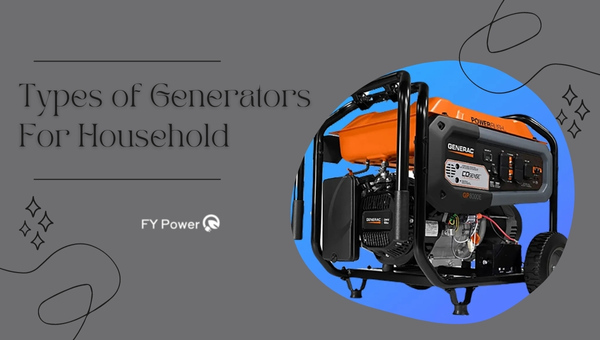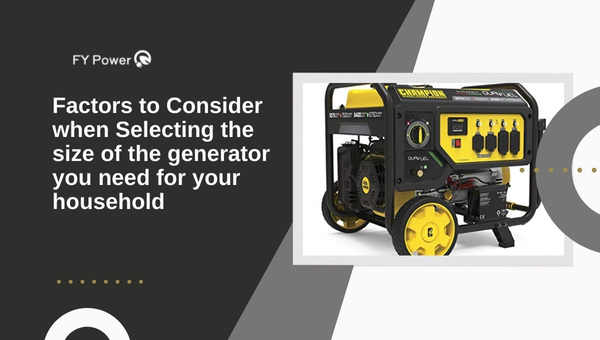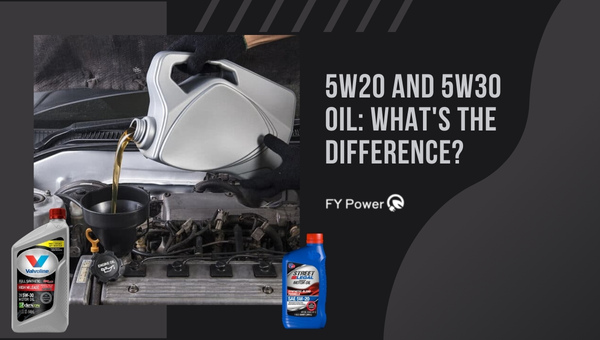When it comes to keeping your home powered, having a backup generator can provide you with peace of mind. Whether you live in an area that is prone to power outages or just wants the security of knowing that your family will have access to electricity no matter what, investing in a generator is a wise decision.
But with so many different types and sizes available on the market today, it can be hard to know which one is best for your household’s needs.
This article will help guide you through the process of choosing the best generator for your household by outlining some key considerations as well as providing tips on how to get started. Read on to know more about Generator.
Determine the wattage of appliances you need to power
When it comes to powering appliances in your home, understanding the wattage you need is essential. Knowing the wattage of each appliance will help you determine what size generator or inverter you will need to power them.

The wattage of an appliance can usually be found on a label on the back or bottom of the appliance. If you can’t find it, then estimate it by finding the electrical current draw (in amperes) and multiplying that by the voltage.
For example, a coffee maker may require 900-1200 watts, while a clock radio only needs 10 watts. A clothes washer could use 350-500 watts, and a clothes dryer might use up to 3000 watts. Other common household appliances such as electric water heaters (immersion), electric water heaters (tankless), evaporative ACs, furnaces, CFL bulbs, weed eaters, and microwaves all have different wattages as well.
It’s important to understand how much power each appliance requires so that you can make sure your generator or inverter is powerful enough to handle them all at once. With this knowledge in hand, you’ll be able to make sure your home is powered safely and efficiently.
Types of Generators For Household

When selecting the best generator for your household, there are a few types of generators available on the market. The most popular kind of generators for home use is the standby generator, portable generators, and inverter generators.
Standby generators
The standby generator is powered by natural gas, diesel, or propane and connected directly to your home’s electrical system. Standby generators are designed to kick in automatically when the power goes out, so you won’t have to manually start it up in an emergency. They usually have a much larger capacity than portable generators and are the most reliable option for long-term outages.
Portable generators
Portable generators are smaller, more affordable versions that can be used in short-term emergencies such as weather events or unexpected outages. They typically run on gasoline and can provide enough power for essential appliances such as lights, refrigerators/freezers, sump pumps, and smaller AC systems. Portable models require manual operation and should not be used with sensitive electronics due to their higher voltage output.
Inverter generator
Inverter generators are the most modern and efficient for home use. They are ideal for powering sensitive electronics such as computers or TVs. Inverter generators are much quieter than other types, so they can be used in residential areas without causing too much disruption.
Factors to Consider when Selecting the generator you need for your household

When determining the size of the generator you need for your household, there are a few key factors to consider.
- First and foremost, you need to identify which appliances will need to be powered during an outage. Once you have a list of these appliances and their corresponding wattages, you can begin to calculate the overall power requirements for your home.
- It’s important to remember that some appliances have a higher wattage requirement when they first start up, such as refrigerators and air conditioners, so you will need to take this into account as well. Additionally, if you plan to run multiple appliances at once, you will need to make sure that your generator has a sufficient wattage output to handle the load.
- When selecting a generator, it’s better to choose one with a slightly higher wattage capacity than you think you’ll need. This will give you some extra benefits in case of unexpected power surges or if you need to power additional appliances in the future.
- Another factor to consider when choosing the size of your generator is your budget. Larger generators with higher wattage capacities tend to be more expensive, so you will need to determine how much you are willing and able to spend.
- Some generators run on gas, while others prefer propane or natural gas. Knowing which fuel type is required beforehand can help narrow down the choice of available generators.
- Noise level the louder the generator, the more disruptive it may be while running. Considering the noise level matters when selecting a model since some will be quieter than others.
Ultimately, selecting the right generator size for your household will depend on your unique needs and circumstances. Taking the time to research and find the right size generator requires a bit of research and comparison shopping to ensure that you get exactly what fits your needs during an emergency. However, you can feel confident that you are making an informed decision and investing in a generator that will meet your needs for years to come.
Find out How Much Can A 7500 Watt Generator Run?
Select A Generator With Enough Outlets To Power All Your Appliances At Once
When selecting a generator, it is important to make sure that you have enough outlets to power all of your appliances at once. Different types of electrical outlets are available for different purposes, and each type has its advantages and disadvantages.
The most common type of outlet is the 15-amp 120-volt outlet, which is found in many older generators. This type of outlet can provide enough power for most small appliances but may not be sufficient for larger items such as air conditioners or refrigerators.
Other types of outlets include 20-amp 120-volt outlets, 30-amp 240-volt outlets, and 50-amp 240/120-volt outlets. These higher voltage outlets are better suited for powering larger appliances.
When selecting a generator, it is important to consider the number and types of outlets that are available so that you can ensure that you have enough power to run all of your appliances at once. It is also important to read the manufacturer’s instructions carefully before using any generator to ensure safety.
Choose A Generator With A Long Run-Time At Half-Load Capacity
When choosing a generator, it is important to consider the run-time at half-load capacity. This is because running a generator at full load for an extended period can cause it to overheat and break down. Fortunately, there are many generators available that have long run times even when operating at half-load capacity.
For gasoline-powered portable generators, you can expect them to run for about 6 to 16 hours, depending on the size of the tank and the model of the generator.
When managed properly, propane-powered portable generators can last up to 150 to 200 hours.
Standby generators should not be left running for more than 500 maximum, while portable generators should not run continuously for more than 12 hours.
If you need a generator with a longer run time, consider investing in one that runs on propane or natural gas. These types of generators are designed to provide reliable power for extended periods and will not overheat as easily as gasoline-powered models. Additionally, they are often quieter and more efficient than their gasoline counterparts.
Honda EU2200i: An Ultimate Review and Care Guide
Research different brands and models to find one that fits your budget and needs best
When choosing a generator, it’s important to consider your budget and needs. Portable generators are great for camping trips and tailgating parties, while standby generators provide reliable backup power for homes and businesses. If you’re looking for something in between, inverter generators offer the convenience of portability with the reliability of a standby generator.
It’s also important to research different brands and models to find one that fits your budget and needs best. Some popular brands include Honda, Generac, Yamaha, Briggs & Stratton, Westinghouse, Champion Power Equipment, and Kohler.
Each brand has its advantages and disadvantages when it comes to features such as fuel type (gasoline or diesel), noise levels (quieter models are better suited for residential use), wattage (higher wattage means more power), and portability (some models are easier to move than others).
Make sure to read reviews from other customers before making your purchase decision
When it comes to purchasing a generator, it’s important to read reviews from other customers before making your decision. Doing so can help you gain an understanding of the features and benefits of different models, as well as any potential drawbacks.
Review reviews can also give insight into how reliable a particular model is and what kind of customer service the manufacturer offers. Additionally, reviews can provide information about the noise level of a generator, which is especially important if you plan on using it in residential areas or close to other people.
Finally, don’t forget to compare prices between different models and brands when shopping for a generator. Doing so will help ensure that you get the best deal possible on your purchase.
Conclusion
Choosing the right generator for your needs is essential in order to ensure a reliable power supply and prevent overheating. Consider factors such as fuel type, wattage, noise levels, and portability when making a purchase decision.
Additionally, read customer reviews to gain an understanding of the features and benefits of different models before investing in one. With these tips in mind, shown in this guide in the above content, you should be able to find a generator that meets all of your requirements without breaking the bank!

